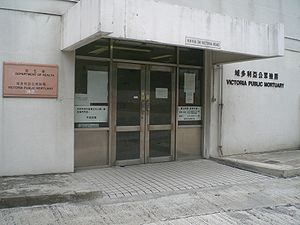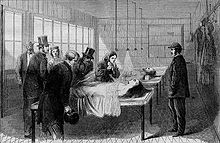- Morgue
-
"Mortuary" redirects here. For the 1983 film, see Mortuary (1983 movie). For the 2005 film, see Mortuary (film).
A morgue or mortuary (in a hospital or elsewhere) is used for the storage of human corpses awaiting identification, or removal for autopsy or disposal by burial, cremation or otherwise. In modern times they have customarily been refrigerated to delay decomposition.
Contents
Etymology and lexicology
The term morgue is derived from the French morgue, which means 'to look at solemnly, to defy'. First used to describe the inner wicket of a prison, where new prisoners were kept so that jailers and turnkeys could recognise them in the future, it took on its modern meaning in fifteenth century Paris, being used to describe part of the Châtelet used for the storage and identification of unknown corpses.
Morgue is predominantly used in North American English, while mortuary is more common in British English, although both terms are used interchangeably. The euphemisms "Rose Cottage" and "Rainbow's End"[1] are sometimes used in British hospitals to enable discussion in front of patients, the latter mainly for children.
A person responsible for handling and washing bodies is now known as a diener, morgue attendant, or autopsy technician.
Types of cold chambers
There are two types of mortuary cold chambers:
- Positive temperature
Bodies are kept between 2°C (36°F) and 4°C (39°F). While this is usually used for keeping bodies for up to several weeks, it does not prevent decomposition, which continues at a slower rate than at room temperature.[2]
- Negative temperature
Bodies are kept at between -10°C (14°F) and -50°C (-58°F). Usually used at forensic institutes, particularly when a body has not been identified. At these temperatures the body is completely frozen and decomposition is very much reduced.[citation needed]
Mortuaries across the world
In some countries, the body of the deceased is embalmed before disposal, which makes refrigeration unnecessary.
In many countries, the family of the deceased must make the burial within 72 hours (three days) of death, but in some other countries it is usual that burial takes place some weeks or months after the death. This is why some corpses are kept as long as one or two years at a hospital or in a funeral home. When the family has enough money to organize the ceremony, the corpse is taken from the cold chamber for burial.
In some funeral homes, the morgue is in the same room, or directly adjacent to, the specially designed ovens, known as retorts, that are used in funerary cremation. Some religions dictate that, should a body be cremated, the family must witness its incineration. To honor these religious rites, many funeral homes install a viewing window, which allows the family to watch as the body is inserted into the retort. In this way, the family can honor their customs without entering the morgue.
Waiting mortuary
A Waiting mortuary is a mortuary building designed specifically for the purpose of confirming that deceased persons are truly deceased. Prior to the advent of modern methods of verifying death, people feared that they would be buried alive. To alleviate such fears, the recently deceased were housed for a time in waiting mortuaries, where attendants would watch for signs of life. The corpses would be allowed to decompose partially prior to burial. Waiting mortuaries were most popular in 19th century Germany, and were often large ornate halls.
A bell was strung to the corpses to alert attendants of any motion. Although there is no documented case of a person being saved from accidental burial in this way,[3] it is sometimes erroneously believed that this was the origin of the phrase "Saved by the bell", whilst in fact, the phrase originates from the sport of boxing.[4]
Alternative meanings
In American English:
- Morgue is used to refer to the room in which newspaper or magazine publishers keep their back issues and other historical references, as they serve a similar purpose to human morgues. See Morgue file.
- Mortuary can also be used to refer to a funeral home.
See also
References
- ^ BBC documentary - Fry's Planet Word: Episode 3: "Uses and Abuses" 9 Oct 2011
- ^ Zentralblatt der allgemeine Pathologie; 1957 May 4; 96(5-6):280-86; NIH.gov
- ^ Roach, Mary (2003). Stiff: The Curious Lives of Human Cadavers. W. W. Norton & Company. ISBN 0-393-32482-6.
- ^ Saved by the bell at Phrases.org
Death and related topics In medicine Abortion · Autopsy · Brain death · Clinical death · End-of-life care · Euthanasia · Lazarus syndrome · Terminal illness · Mortal woundLists Causes of death by rate · Expressions related to death · Natural disasters · People by cause of death · Premature obituaries · Preventable causes of death · Notable deaths in 2007 · Notable deaths in 2008 · Notable deaths in 2009 · Notable deaths in 2010 · Unusual deathsMortality After death Body: Burial · Coffin birth · Cremation · Cryonics · Decomposition · Disposal · Mummification · Promession · Putrefaction · Resomation
Other: Afterlife · Cemetery · Customs · Death certificate · Funeral · Grief · Intermediate state · Mourning · VigilParanormal Legal Other Death and culture · Death (personification) · Fascination with death · Genocide · Last Rites · Martyr · Moribundity · Sacrifice (Human · Animal) · Suicide · Assisted suicide · Thanatology · WarCategories:- Death
- Forensic facilities
Wikimedia Foundation. 2010.


